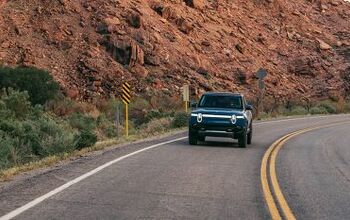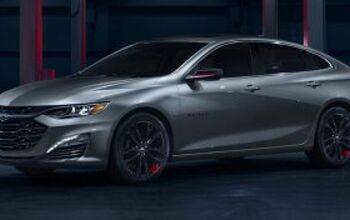Do It for the Children: Honda and Toyota Sticking With Small Cars for the Sake of Our Children, and Our Childrens' Children
The Dodge Dart is dead. The Ford Fiesta is likely on its last legs in the United States. Ford Focus production is moving to China, off the North American continent where demand for Ford small cars is rapidly declining. General Motors is scaling back production at the Chevrolet Sonic’s Orion Township, Michigan, assembly plant.
That’s the Detroit small car picture, or at least part of it. From Japan’s perspective, however, small cars are entirely worth it, not just because of the sales success enjoyed by the Honda Civic (currently America’s best-selling car through 2017’s first seven months) and Toyota Corolla, but because of the demographic small cars target.
“Small cars get our buyers hooked from cradle to grave,” Toyota spokesperson Curt McAllister tells The Detroit News. “If you get them into the family early, then you can keep them on up the family tree.”
Full-size pickup trucks transacting at an average price of $46,441, according to Kelley Blue Book, are hugely profitable machines for the Detroit Three. But such vehicles might not serve as the ideal ticket for budget-conscious first-time auto buyers.
Volume remains quite low in the subcompact car category, not just for Detroit’s Ford Fiesta and Chevrolet Sonic but for most Japanese automakers as well. Even the segment-leading Nissan Versa has seen its sales plunge by nearly a quarter this year as Nissan seeks to foster greater support for certified pre-owned vehicles.
Yet in Honda’s case, for instance, “Seventy percent of Fit buyers are first-time buyers,” says vice president at American Honda, Jeff Conrad. True, Fit volume is low, substantially lower than even the nosediving Versa. Honda reported a 5-percent drop to 31,126 Fit sales in America in the first seven months of 2017. But Conrad says, “We’re interested in an entry point for cars and trucks. The Fit is that product for cars and HR-V is that for trucks.” HR-V sales are up 29 percent this year to 56,407 units in 2017.
For the trio of large Japanese automakers — Toyota, Nissan, Honda — that continue to offer a full slate of small cars in America, it’s not an either/or comparison. Subcompact crossovers such as the Ford EcoSport do not invariably have to cancel out subcompact cars such as the Ford Fiesta. According to KBB, subcompact crossovers require, on average, $7,704 more to acquire than subcompact cars.
In other words, subcompact crossovers have every potential to continue as high-profit-margin vehicles for automakers of all stripes, but they don’t compete at the most affordable end of the spectrum. Their ATPs are almost precisely in line with midsize cars.
If the cradle-to-grave theory expressed by Toyota is a fact-based business theory, automakers that forsake the most affordable corner of the market are losing out on the opportunity to capture lifelong buyers who’ll eventually move up the ladder: Yaris iA, Corolla, C-HR, Camry/RAV4, Highlander, RX350, LC500.
Honda, meanwhile, doesn’t feel as though the abandonment experienced by the small car sector is worthy of concern for automakers that are operating successfully in said sector. “People have abandoned segments for a long time,” Honda’s Conrad says. “A few years ago a lot of manufacturer sold minivans. How many manufacturers really make a serious run at selling (them) anymore? Not many, but we’re still in it and we sold over 120,000 last year.”
[Images: Honda, Nissan, Toyota]
Timothy Cain is a contributing analyst at The Truth About Cars and Autofocus.ca and the founder and former editor of GoodCarBadCar.net. Follow on Twitter @timcaincars.
More by Timothy Cain
Latest Car Reviews
Read moreLatest Product Reviews
Read moreRecent Comments
- Lou_BC Well, I'd be impressed if this was in a ZR2. LOL
- Lou_BC This is my shocked face 😲 Hope formatting doesn't fook this up LOL
- Lou_BC Junior? Would that be a Beta Romeo?
- Lou_BC Gotta fix that formatting problem. What a pile of bullsh!t. Are longer posts costing TTAC money? FOOK
- Lou_BC 1.Honda: 6,334,825 vehicles potentially affected2.Ford: 6,152,6143.Kia America: 3,110,4474.Chrysler: 2,732,3985.General Motors: 2,021,0336.Nissan North America: 1,804,4437.Mercedes-Benz USA: 478,1738.Volkswagen Group of America: 453,7639.BMW of North America: 340,24910.Daimler Trucks North America: 261,959




































Comments
Join the conversation
I'd rather have a small car for the sole reason that they are more fun to drive. I'd consider a VW GTI but in today's America the size of the VW Golf concerns me. On the road are a majority of big SUVs weighing two tons and usually more. It's the safety angle that worries me by being hit by one of those huge SUVs. Do any of you folks have a similar concern that would keep you from buying a well built small car?
I guess this means that in a few years my 2014 Fiesta ST might actually start to appreciate. Think I will hang onto it for a while.